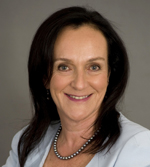April 2013

Zea Borok, MD
By Hillel Kuttler
It should come as no surprise that in her free time, Zea Borok, MD, enjoys a good mystery novel. “In the laboratory, I’m really functioning as an investigator,” she says. “I’m a problem solver. There’s the sleuth and detective work, and then there’s a solution. Things have to fit together.”
Nearly three decades into her medical career, Zea Borok, MD, remains passionate about her chosen profession and specialty. As the chief of pulmonary, critical care, and sleep medicine at the University of Southern California’s Keck School of Medicine in Los Angeles, Dr. Borok divides her time between research, administrative, and clinical work.
An extraordinary drive and a high degree of inquisitiveness serve Dr. Borok well in the laboratory. Her research centers on alveolar epithelial cell function and differentiation in the context of lung injury and fibrosis. She’s now examining a gene involved in normal cell differentiation. When the gene is eliminated in laboratory animals, cancer of the lung results. “It’s bad for the animals to have a tumor, but it gives us new insight into what this gene is doing and how it can go wrong,” Dr. Borok says. “It’s the sleuth work: I have to figure out why.”
Edward Crandall, MD, USC’s chair of medicine, has worked with Dr. Borok for more than 20 years., Dr. Crandall had hired Dr. Borok as a junior faculty member when he was chief of pulmonary and critical care medicine
“Zea was a hard worker, very smart, and she kind of rose to the top and took over the day-to-day leadership of the lab after a while,” Dr. Crandall says. “She’s been very successful at leadership as well as at research. I rely on her to keep the lab and research moving forward: developing new techniques and methodologies. On the clinical side, she’s a very effective leader in a very busy environment.”
As she clocks in nearly 70 hours a week, Dr. Borok also tends to her husband, Anthony Sank, MD, a plastic surgeon afflicted with Lou Gehrig’s disease. Shortly after Dr. Borok finished her medical training, her husband fell ill, and for 10 years, Dr. Borok juggled her professional and marital responsibilities. Dr. Sank now lives in a San Diego nursing home, unable to communicate.
“I still take care of him,” Dr. Borok says. “Every cloud has a silver lining. I think it made me a more compassionate person. It made me much more aware that once you ask, you find out that everybody has problems. We don’t necessarily get to choose which ones.”
Compassion is what drew Dr. Borok to the medical profession and the pulmonary path, in particular. A native of South Africa, Dr. Borok graduated medical school at age 23. She considered surgery, but opted for critical care because of its strong procedural component and the ability it afforded to treat the “whole patient.” After a fellowship in critical care medicine at Presbyterian-University Hospital in Pittsburgh, she completed fellowship training in pulmonary medicine at the National Institutes of Health.
“Even when I was an intern in South Africa, I said to my mom, ‘I can’t believe they’re paying me to do stuff I did as a student,'” she says.
Dr. Borok sees great importance in her work as director of the school’s pulmonary and critical care fellowship training program. She does not have children, but uses the language of a parent in discussing how she helps raise the next generation of physicians.
Her work as an administrator at USC evolved from fellows in training approaching Dr. Borok for advice. “I was sort of the mother who helped them solve problems, which is interesting because I’m not a very soft person—I’m very direct,” she says. “Even though it’s a tremendous amount of work, it’s rewarding because you can mold young people’s career choices, making them better doctors by counseling them on the intangibles: dealing with people, being professional, taking responsibility for your actions, just being a good human being. By intangibles, I mean values. You have a major role in giving them feedback and making them better physicians.”
Life in ATS
Member Since: 1991
Primary Assembly: Respiratory Cell & Molecular Biology
Within the ATS, Dr. Borok applies her sleuthing skills in the stem cell and lung fibrosis working groups. She serves an associate editor of the American Journal of Respiratory Cell and Molecular Biology and as a member of the ATS Training Committee. She’s also chaired the Assembly on Respiratory Cell and Molecular Biology and alternately serves in its planning, executive, and program committees.

